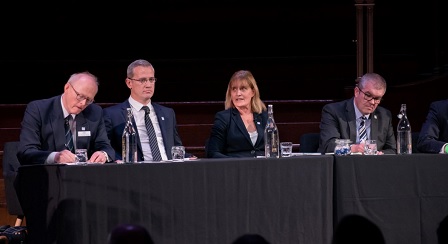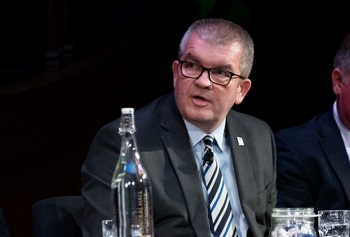
Policing Panel: (L-R) Sir Tom Winsor, HM chief inspector of constabulary, Director of the College of Policing Bernie O’Reilly, Federation Deputy National Treasurer Sarah Johnson, Chair of the National Police Chiefs’ Council Martin Hewitt
The starting salary for new recruits is “unrealistic”, according to the head of the National Police Chiefs’ Council (NPCC) and will make recruiting the 20,000 more challenging.
During a talk on policing priorities at the Federation’s Centenary event yesterday (November 21), panellists were asked by attendees whether a starting salary of £18,000 will affect the ability to recruit 20,000 officers.
Chair of the National Police Chiefs’ Council Martin Hewitt replied: “Definitely.”
“What we’ve found is starting salaries differ considerably around the country, but I don’t think that figure is a realistic figure for someone who is coming into policing.
“When we put the bid in to the Home Office for the funding, we set a mid-level range.
“We’ve got to have those conversations because we want people to come in with certain skills and aspirations.
“We’ve got to work to get to a point where the starting salary is an acceptable starting salary and the ability for someone to earn more as they progress in their career is there.”
Sir Tom Winsor, HM chief inspector of constabulary, added that this starting salary is only for the first six months and that new graduates in other sectors work on lower salaries than police officers.
He continued in order to successfully recruit and retain, the service needs to be more attractive with better pay and conditions.
Reflecting on the past, he also agreed that reforms on overtime could have “been more radical” in his independent review of police officer and staff remuneration and conditions, published March 2011.
Other topics discussed included officers under increasing pressure from responding to mental health callouts.
Director of the College of Policing, Bernie O’Reilly agreed police are not the best people to deal with a person on crisis, highlighting a system used in Hampshire Constabulary, where officers do not respond to callouts involving mental health incidents unless it meets a threat and risk assessment.
Federation Deputy National Treasurer Sarah Johnson stressed the situation is getting worse and it is not right that officers are being used as a last resort, adding there needs to be more funding for mental health and social services to quell the issue, whist Sir Winsor warned this is “unsustainable” with officers under “intolerable strain”.
The panel also discussed:
- Technology – The need for forces to invest in new technologies such as AI to improve efficiency
- Force structuring – There was agreement across the board that forces could somehow in the future use the same systems, with frustrations over forces all having different ways of working – sometimes impeding information sharing between them to protect the public
- Diversity – There are challenges with the ongoing recruitment drive surrounding this. All panellists agreed things have improved, but more still needs to be done to boost diversity. It was acknowledged the biggest challenge will be the amount of time for forces to be more representative of the communities they serve. The service is also “decades away” from having a workforce comprising 50% women and 45% BAME, according to CC Hewitt














